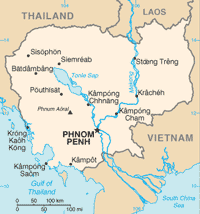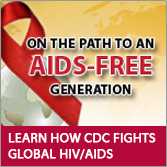Cambodia
HIV/AIDS in Cambodia
- 0.8% Estimated HIV Prevalence
(Age 15–49) (2013) - 2,200 Estimated AIDS Deaths (2013)
- N/A Estimated Orphans due to AIDS
- 44,318 Reported Number of Adults Receiving Antiretroviral
Therapy (ART) (2012) - 82% Estimated ART Coverage per WHO 2010 Guidelines (2012)
SOURCE:
UNAIDS Gap Report, 2014; UNAIDS Global Report, 2013

Strategic Focus
Cambodia is one of the few countries in the world that has achieved its Millennium Development Goals related to HIV. In the past decade, Cambodia has cut adult HIV prevalence by nearly 60% and has achieved the universal access target for treatment, with approximately 80% of adults and children estimated to be in need receiving antiretroviral treatment. The recently launched third strategic plan, “Cambodia 3.0,” builds on these successes and outlines an approach for eliminating new HIV infections and AIDS deaths by 2020.
CDC has played a critical role in supporting Cambodia in its efforts to eliminate HIV by providing technical and financial support to the Ministry of Health (MOH), the National Center for HIV/AIDS, Dermatology and STDs (NCHADS), and the National Maternal and Child Health Center (NMCHC) to prevent mother-to-child transmission (PMTCT) of HIV, strengthen blood and injection safety activities and services, increase voluntary confidential counseling and testing, and improve and expand HIV care and treatment programs through the highly successful continuum of care framework. CDC also provides technical leadership and assistance to the MOH to strengthen epidemiologic analysis, surveillance, operations research, and to improve laboratory and workforce capacity. Additionally, CDC plays a key role in supporting NCHADS and the MOH in utilizing their considerable Global Fund resources in Cambodia through targeted technical assistance and program support.
Key Activities and Accomplishments
-
Supported NCHADS and NMCHC to rapidly improve HIV testing rates and antiretroviral therapy (ART) provision among pregnant women in antenatal care and labor wards; introduced rapid, point-of-care service HIV and syphilis testing; and improved follow-up through the PMTCT cascade for HIV-infected mothers and their HIV exposed infants.
-
Collaborated with NCHADS and NMCHC to initiate an evaluation of PMTCT coverage and yield in seven provinces. The preliminary data analysis will begin in July 2014.
-
Worked with NCHADS to conduct a sexually transmitted infection (STI) survey among sex workers to determine the current types and prevalence of STIs and assess behavioral risk factors for STIs.
-
Supported NCHADS in the development of a comprehensive mapping procedure to identify locations of risk behavior and local number of people practicing HIV/ STI risk behaviors in order to target local prevention efforts more efficiently and effectively.
-
Helped revise the HIV Counseling and Testing Standard Operating Procedures (SOP) in 2012, which included new approaches for providing HIV counseling and testing in community settings for most-at-risk populations as well as a new diagnostic algorithm.
-
Translated point-of-care testing pilot into practice and assisted the MOH in developing protocols and a national training curriculum to increase HIV testing in most-at-risk populations using peer networks. Collaborated with NCHADS to initiate a case management coordination approach to improve retention of newly identified HIV-positive clients into care and treatment.
Contact Us:
- Centers for Disease Control and Prevention
1600 Clifton Rd
Atlanta, GA 30333 - 800-CDC-INFO
(800-232-4636)
TTY: (888) 232-6348
24 Hours/Every Day - cdcinfo@cdc.gov
 ShareCompartir
ShareCompartir



